
A lot of people think poker is a game of pure chance but when you add betting to the mix it becomes a much more complicated game. The fact is that it requires a lot of skill and psychology.
For example, one of the key skills that you learn as a poker player is how to read your opponents. This is something that you need to do in order to figure out whether they’re bluffing or just holding a crappy hand. It’s also a very useful skill to have outside of poker as it can help you in a lot of different situations, from selling to someone to giving a presentation.
Another good thing about poker is that it teaches you how to calculate odds and percentages quickly on the fly. This is something that’s extremely useful in any situation where you need to make a quick decision. It’s also a great way to exercise your brain and develop your critical thinking skills. The more you play, the better at it you will become. Plus, it’s been shown that consistent poker playing can actually delay degenerative neurological diseases like Alzheimer’s and dementia.
Lastly, poker can teach you how to manage your money and keep track of your bankroll. It’s important to have this skill as it can help you make smarter financial decisions in the future and avoid bad habits. Plus, it’s also a fun and social way to spend time with friends.
Poker is a very social game and being around other people who have the same interest can be very beneficial for your mental health. Whether you’re playing at home or at a real casino, it’s always nice to have some company while you’re enjoying the game.
It’s also a great way to meet new people and make friends. The poker community is a very social and welcoming place where you can meet people from all walks of life. There are even plenty of opportunities to compete in tournaments and win cash prizes.
One of the biggest mistakes that new players make is getting tunnel vision and only worrying about their own hand. The truth is that most of the time your opponent will have a crappy hand as well. In this case, betting is often the better option as they will usually miss the flop and you will have the best possible hand at that point (trip 7’s).
This approach to poker is a very systematic and mathematical one. It’s not easy to learn but it’s definitely worth the effort. You’ll find that it changes the way you think about poker and can make you a much more profitable player in the long run. In other words, it can turn you from a break-even beginner into a big-time winner. So, don’t be afraid to give it a try! You won’t regret it. You can always start small and work your way up to bigger games as you get more comfortable.